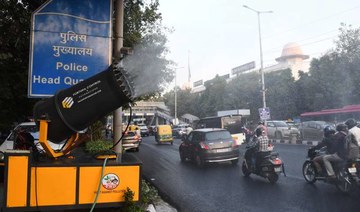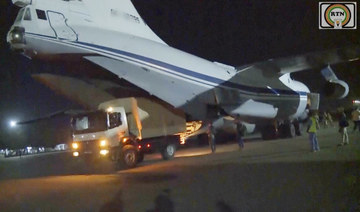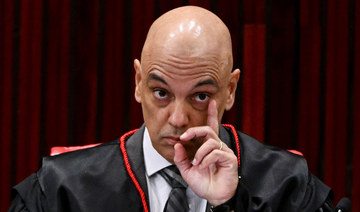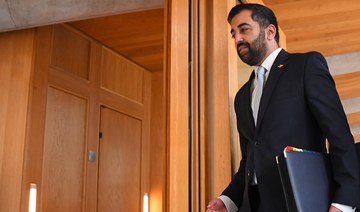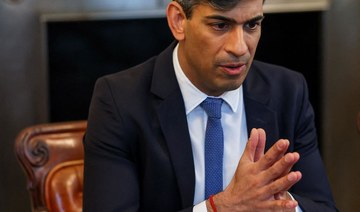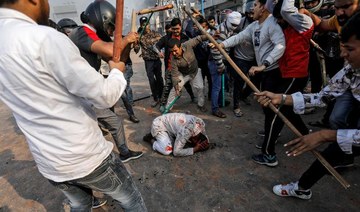COPENHAGEN: Premature deaths caused by fine particle air pollution have fallen 10 percent annually across Europe, but the invisible killer still accounts for 307,000 premature deaths a year, the European Environment Agency said Monday.
If the latest air quality guidelines from the World Health Organisation were followed by EU members, the latest number of fatalities recorded in 2019 could be cut in half, according to an EEA report.
Deaths linked to fine particular matter — with a diameter below 2.5 micrometres or PM2.5 — were estimated at 346,000 for 2018.
The clear reduction in deaths for the following year were put down partly to favourable weather but above all to a progressive improvement in air quality across the continent, the European Union's air pollution data centre said.
In the early 1990s, fine particles, which penetrate deeply into the lungs, led to nearly a million premature deaths in the 27 EU member nations, according to the report.
That figure had been more than halved to 450,000 by 2005.
In 2019, fine particulate matter caused 53,800 premature deaths in Germany, 49,900 in Italy, 29,800 in France and 23,300 in Spain.
Poland saw 39,300 deaths, the highest figure per head of population.
The EEA also registers premature deaths linked to two other leading pollutants, but says it does not count them in its overall toll to avoid doubling up.
Deaths caused by nitrogen dioxide — mainly from car, trucks and thermal power stations — fell by a quarter to 40,000 between 2018 and 2019.
Fatalities linked to ground-level ozone in 2019 also dropped 13 percent to 16,800 dead.
Air pollution remains the biggest environmental threat to human health in Europe, the agency said.
Heart disease and strokes cause most premature deaths blamed on air pollution, followed by lung ailments including cancer.
In children, atmospheric pollution can harm lung development, cause respiratory infections and aggravate asthma.
Even if the situation is improving, the EEA warned in September that most EU countries were still above the recommended pollution limits, be they European guidelines or more ambitious WHO targets.
According to the UN health body, air pollution causes seven million premature deaths annually across the globe — on the same levels as smoking and poor diet.
In September, the alarming statistics led the WHO to tighten its recommended limits on major air pollutants for the first time since 2005.
"Investing in cleaner heating, mobility, agriculture and industry improves health, productivity and quality of life for all Europeans, and particularly the most vulnerable," said EEA director Hans Bruyninck.
The EU wants to slash premature deaths due to fine air pollution by at least 55 percent in 2030 compared to 2005.
If air pollution continues to fall at the current rate, the agency estimates the target will be reached by 2032.
However an ageing and increasingly urbanised population could make that more difficult.
"An older population is more sensitive to air pollution and a higher rate of urbanisation typically means that more people are exposed to PM 2.5 concentrations, which tend to be higher in cities," said the report.
Air pollution in Europe still killing 300,000 a year: report
https://arab.news/833wc
Air pollution in Europe still killing 300,000 a year: report
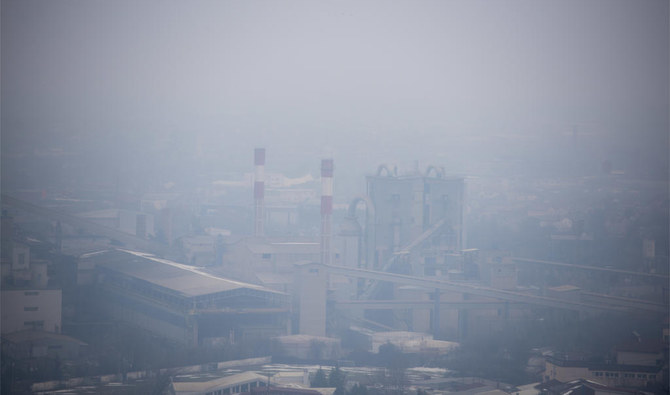
- Deaths caused by nitrogen dioxide — mainly from car, trucks and thermal power stations — fell by a quarter to 40,000 between 2018 and 2019
Niger receives new Russian advisers, equipment
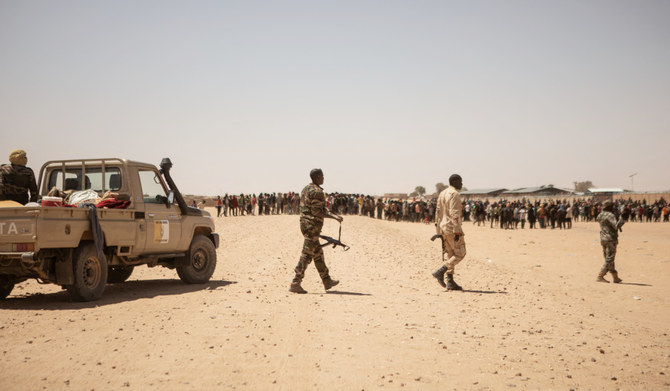
- US Defense Secretary Lloyd Austin indicated on Thursday that Russian troops were now installed at a Nigerien air base near the Niamey airport that also houses US troops
NIAMEY: New Russian military advisers and military equipment have arrived in Niger, according to state television in the African country that wants US forces to leave.
A first set of about 100 Russian advisers arrived in Niger on April 10, along with air defense systems.
Two military transporters arrived on Saturday, according to Tele Sahel that said Russia has now sent three cargo planes of military material and instructors in the past month.
The Africa Corps, seen as the successors of the Wagner paramilitary group in Africa, confirmed the instructors’ arrival in a posting on the group’s Telegram account.
FASTFACT
US Defense Secretary Lloyd Austin indicated that Russian troops were now installed at an air base near the Niamey airport that also houses US troops.
On Saturday, it said more trainers, equipment, and food products had arrived.
US Defense Secretary Lloyd Austin indicated on Thursday that Russian troops were now installed at a Nigerien air base near the Niamey airport that also houses US troops.
Niger’s military regime, which took power in a July 2023 coup, expelled French troops based in the country and then denounced a military cooperation agreement with the US.
It said this had been “unilaterally imposed” by Washington.
Washington agreed in April to withdraw roughly 1,000 soldiers from the country.
Negotiations are underway between the United States and Niger about the withdrawal.
US forces have a key drone base near Agadez, built at a cost of about $100 million.
Niger’s military leaders have moved closer to Russia, as have Mali and Burkina Faso, which also have military coup leaders and are fighting rebel groups affiliated with Al-Qaeda and Daesh.
In April, Idrissa Soumana Maiga, head of the private L’Enqueteur newspaper, was imprisoned after an article mentioned the “presumed” installation of Russian listening devices in official buildings.
Race against time to rescue Brazil flood victims after dozens killed

- The rainfall eased Saturday night but was expected to continue for the next 24-36 hours, with authorities warning of landslides
PORTO ALEGRE, Brazil: Authorities were racing against time on Sunday to rescue people from raging floods and mudslides that have killed more than 50 and forced nearly 70,000 to flee their homes in southern Brazil.
Viewed from the air, Porto Alegre, the capital of Rio Grande do Sul state, is completely flooded, with streets waterlogged and the roofs of some houses barely visible.
The Guaiba River, which flows through the city of 1.4 million people, reached a record high level of 5.09 meters, according to the local municipality, well above the historic peak of 4.76 meters that had stood as a record since devastating 1941 floods.
The water was still advancing into economically important Porto Alegre and around a hundred other localities, with increasingly dramatic consequences.
FASTFACT
The Guaiba River, which flows through the city of 1.4 million people, reached a record high level of 5.09 meters, according to the local municipality, well above the historic peak of 4.76 meters that had stood as a record since devastating 1941 floods.
In addition to some 70,000 residents forced from their homes, Brazil’s civil defense agency also said more than a million people lacked access to potable water amid the flooding, describing the damage as incalculable.
The agency put the death toll at 55, although that did not include two people killed in an explosion at a flooded gas station in Porto Alegre that was witnessed by an AFP journalist.
At least 74 people are also missing, it said.
Rosana Custodio, a 37-year-old nurse, fled her flooded Porto Alegre home with her husband and three children.
“During the night on Thursday the waters began to rise very quickly,” she told AFP via a WhatsApp message.
“In a hurry, we went out to look for a safer place. But we couldn’t walk … My husband put our two little ones in a kayak and rowed with a bamboo. My son and I swam to the end of the street,” she said.
Her family was safe but “we’ve lost everything we had.”
The rainfall eased Saturday night but was expected to continue for the next 24-36 hours, with authorities warning of landslides.
Authorities scrambled to evacuate swamped neighborhoods as rescue workers used four-wheel-drive vehicles — and even jet skis — to maneuver through waist-deep water in search of the stranded.
UK Labour official acknowledges electoral backlash over Gaza

- Analysis shows decline of nearly 18 percent in Labour vote in areas where over a fifth of the population are Muslim
LONDON: A senior Labour official on Sunday said the party has to recalibrate its campaigning strategy to win back voters opposing its position on Gaza, The Observer reported.
Pat McFadden, Labour’s national election coordinator, told the BBC program “Sunday with Laura Kuenssberg” that it would “work to get people’s support back,” and that the Middle East is a “high foreign policy priority” for the party.
Analysis has revealed that despite substantial gains in Thursday’s local elections in England, as well as Sadiq Khan securing a third term as mayor of London, there was a decline of nearly 18 percent in the Labour vote in areas of the country where over a fifth of the population identify as Muslim.
The analysis, conducted across 930 wards by Prof. Will Jennings from the University of Southampton, highlighted the extent of the protest vote against Labour leader Keir Starmer’s stance on Gaza, particularly his delay in calling for a ceasefire.
Ali Milani, chair of the Labour Muslim Network, voiced concern over the sense of betrayal within the Muslim community.
“We are now seeing the electoral consequence of that,” Milani told The Obsever. “If I was a Labour MP in Bradford or Birmingham or Leicester or parts of London or Manchester, I would be seriously concerned.”
Jennings said: “What this highlights is certainly that Labour is in an uncomfortable position on Gaza. And it is not just Muslim voters.
“But in a general election when we are looking at an anti-incumbent mood and there are fewer small parties and independents, we shouldn’t expect the pattern to be repeated.”
Labour MP Ellie Reeves said: “We have recognized the strength of feeling on this issue. We have called for an immediate ceasefire, we have also said there should absolutely be no ground offensive on Rafah.”
When questioned about Labour’s previous stance on the war, she told The Observer: “Keir Starmer has always been clear that our position would always respond to what is happening there.”
Syrian asylum-seeker plans suicide if sent to Rwanda
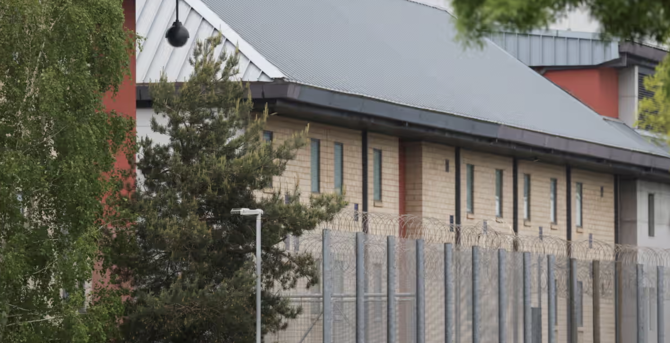
- Man identified as Khaled among more than 100 people set to be sent to East African country
- ‘I will not be safe in Rwanda. If they manage to send me there, I will kill myself on arrival’
LONDON: A Syrian asylum-seeker in the UK set to be deported to Rwanda has said he will kill himself if sent to the East African country.
The man, identified as Khaled, is being held at Colnbrook Immigration Removal Centre with a number of other people due to be sent to Rwanda.
He told The Guardian: “Everyone is so stressed in here because of Rwanda. We can’t eat and we can’t sleep. I was displaced in Syria for nine years and was imprisoned there and I was also detained and tortured in Libya.
“Being in detention is very triggering for me. What matters to asylum-seekers is to be safe. I will not be safe in Rwanda. If they manage to send me there, I will kill myself on arrival in that country.”
Khaled has been in the UK since 2022, and discovered he could be sent to Kigali for the first time in February 2023. He was detained with a view to removal last week.
“They arrested me and put me in handcuffs in a police cell. The same thing happened to two other people who were reporting — Iraqi Kurds. After we were taken out of the cell we were handcuffed again and taken in a van to the detention centre,” he said.
“I have been trying to see a doctor in the detention centre because of an infection in my leg I need antibiotics for but so far I haven’t managed to get an appointment.”
Another asylum-seeker who did not give his name, and who arrived in the UK from Sudan in 2022, told The Guardian that he had traveled via the Mediterranean and the boat he had been on almost sank.
“I would have been happy to claim asylum in Italy but Italian officials did not fingerprint me and told me to move on to France. There I was told it would be four years before they could consider my asylum claim so I waited in the jungle in Calais to cross to the UK. Crossing the Channel in an overcrowded boat was even more terrifying than crossing the Mediterranean,” he said.
“When I heard about the government’s plans to send asylum-seekers to Rwanda at the beginning of 2023 I was very frightened.
“I escaped from an African country because it was not safe and I am very scared to be deported to another African country because I know it will not be safe for me.
“I was arrested last week when I went to report in Newcastle. They didn’t mention Rwanda until I reached the detention centre and at first just said ‘We are deporting you to a safe third country.’”
The two men told The Guardian that they were struggling to contact legal representatives while in detention, with a seven-day deadline imposed by the Home Office for those wishing to appeal the decision to send them to Rwanda.
The charity Care4Calais has published data suggesting that of the more than 100 people detained to be sent to Rwanda, most come from war zones.
The charity’s head of legal access, Hannah Harwood, said: “The people detained have not had their asylum claims processed, and it’s clear from the first cohort we are in contact with that if their claims were processed they would probably be granted refugee status in the UK. It reaffirms how shameful the Rwanda plan is and why it must be stopped.”
A Home Office spokesperson said: “We take the welfare of people in our care extremely seriously. There are robust safeguarding measures in place to ensure everyone is treated with dignity and has the support they need.
“All detained individuals have access to a mobile phone, internet and landline telephones so they can keep in contact with friends, family and other support.”
Fake videos of Modi aides trigger political showdown in India election
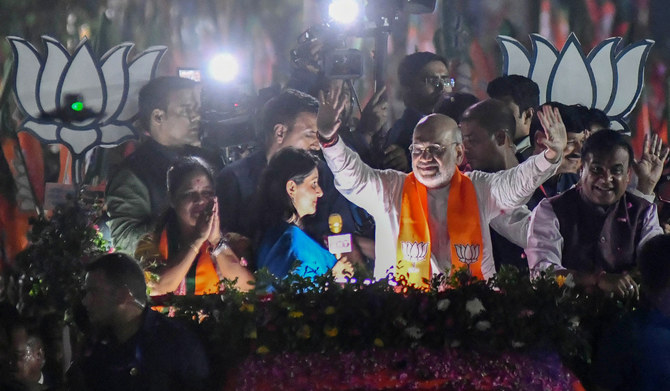
- Congress social media coordinator arrested by Delhi police
BENGALURU, LUCKNOW: Manipulated videos are taking center stage as campaigning heats up in India’s election, with fake clips involving two top aides of Prime Minister Narendra Modi triggering police investigations and the arrest of some workers of his rival Congress Party.
In what has been dubbed as India’s first AI election, Modi said last week fake voices were being used to purportedly show leaders making “statements that we have never even thought of,” calling it a conspiracy “to create tension in society.”
Indian police — already investigating the spread of fake videos showing Bollywood actors criticizing Modi — are now investigating a doctored online clip that showed Federal Home Minister Amit Shah saying the ruling Bharatiya Janata Party will stop certain social guarantees for minorities, a subject sensitive for millions of voters.
Shah retorted on X, posting his “original” and the edited “fake” speech and alleging — without providing any evidence — that the main opposition Congress was behind the video it created to mislead the public. The minister said “directions have been issued to the police to address this issue.”
Indian police arrested at least nine people, including six members of Congress’ social media teams, in the states of Assam, Gujarat, Telangana and New Delhi last week for circulating the fake video, according to police statements.
Five of the Congress workers were released on bail, but the most high-profile arrest made by the cyber crime unit of New Delhi police came on Friday, when they detained a Congress national social media coordinator, Arun Reddy, for sharing the video. New Delhi is one region where Shah’s ministry directly controls police. Reddy has been sent into three-day custody.
The arrest has sparked protests from Congress workers with many posting on X using the #ReleaseArunReddy tag. Congress lawmaker Manickam Tagore said the arrest was an example of “authoritarian misuse of power by the regime.”
Congress’ head of social media, Supriya Shrinate, did not respond to messages and an email seeking comment.
India’s election from April 19 to June 1 will be the world’s largest democratic event.
With nearly a billion voters and more than 800 million internet users, tackling the spread of misinformation is a high stakes job. It involves round-the-clock monitoring by police and election officials who often issue take down orders to Facebook and X as investigations start.
In India’s most populous state of Uttar Pradesh, more than 500 people keep tabs on online content, flagging controversial posts and coordinating with social media companies for their removal when needed, police chief Prashant Kumar told Reuters on Saturday.
Another fake video that sparked a storm last week showed Yogi Adityanath, the state’s chief minister, criticizing Modi for not doing enough for families of those who died in a 2019 militant attack.




